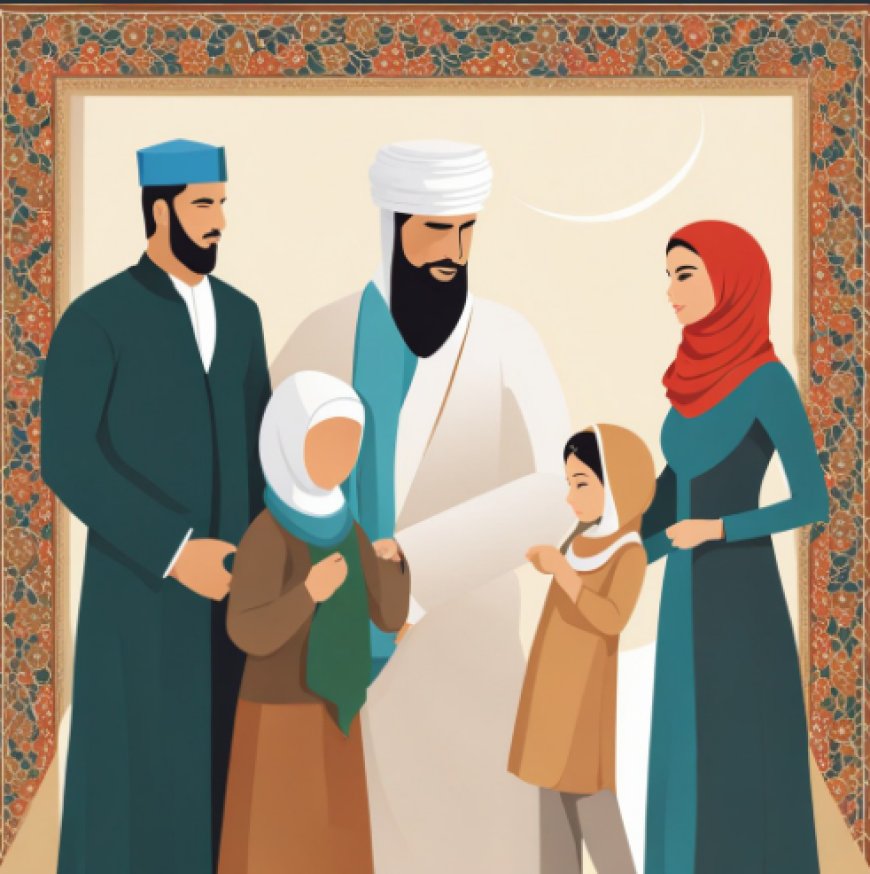Common Marital Problems and How to Deal with Them in the Light of Islam
Common marital problems are challenges that many couples face during their married life. These issues can range from communication problems and financial stress to differences in values and expectations. In the light of Islam, addressing these problems involves a combination of patience, empathy, and adherence to Islamic teachings. Islam encourages open and respectful communication between spouses, seeking solutions through dialogue and compromise. It emphasizes the importance of maintaining love, compassion, and understanding within the marriage. Additionally, seeking guidance from Islamic scholars or counselors can also be helpful in resolving marital issues according to Islamic principles.

Common marital issues are a natural part of the marital experience, where couples face challenges and difficulties at various stages of their lives together. Culture and religion play a significant role in how these issues are dealt with and resolved. In Islam, marriage is considered a divine institution built on love and compassion, and it is of utmost importance to maintain and strengthen it. This article will explore how to address common marital issues in the context of Islam and how the Islamic faith provides guidance and solutions to such challenges. We will delve into some of the most significant problems that couples face and explore how to navigate them using the principles and values of Islam, which emphasize love, compassion, and mutual respect.
Jealousy and How to Control It in Marital Relationships According to Islam
Jealousy is a common marital issue faced by many couples in their shared lives. Islam considers jealousy in marital relationships as a natural and human emotion but emphasizes the need to control it in a proper manner based on Islamic values. This topic can be divided into several key points to understand how to manage jealousy in marital relationships according to Islam:
-
Understanding the Concept of Jealousy: First and foremost, couples should understand what jealousy is and what triggers it. Jealousy can result from love and care, but it needs to be managed correctly to avoid any negative impact on the relationship.
-
Trust in the Spouse: Trust is the foundation of a strong marital relationship. Couples should build mutual trust through transparency and friendship. When both partners trust each other, the level of jealousy can be reduced.
-
Effective Communication: Effective and open communication between spouses can help in understanding each other's feelings and providing support when needed. It is advisable to discuss any issues or concerns that trigger jealousy calmly and respectfully.
-
Avoiding Jealousy-Inducing Situations: Couples should avoid putting themselves in situations that may trigger jealousy. For example, avoiding excessive social media browsing or engaging in inappropriate conversations with others.
-
Seeking Guidance from the Quran and Hadith: Couples can turn to the Quran and Hadith (the sayings and actions of the Prophet Muhammad) to find guidance and Islamic rulings regarding jealousy and how to deal with it. The Quran and Hadith provide positive examples of how couples can manage feelings of jealousy.
-
Solidarity and Understanding: Couples should be supportive and understanding of each other. Understanding and honest dialogue can strengthen the relationship and reduce jealousy.
-
Emotional Control: Couples need to learn how to control their emotions and think clearly so that jealousy does not lead to inappropriate actions in the relationship.
In conclusion, Islam shows that controlling jealousy and dealing with it wisely and understandingly is of great importance in building a healthy and sustainable marital relationship. This process may require time and effort, but it contributes to enhancing trust and happiness between spouses.
Managing Marital Disputes: Differing Opinions and Islamic Solutions
Disagreements in marital life are natural and inevitable, and they can have a constructive role if managed wisely and thoughtfully. Islam provides guidance on how to handle these disputes with caution and clear directives aimed at preserving marital stability and nurturing the relationship. Here are some essential points on how to manage marital disputes and differing views in the light of Islam:
-
Mutual Understanding and Friendship: Islam encourages mutual understanding and building friendship in marital relationships. This can help mitigate the intensity of disputes and channel them toward positive solutions.
-
Constructive Dialogue: Constructive and honest dialogue is essential to understanding differing perspectives. Spouses should be able to discuss their issues calmly and comprehensively.
-
Mutual Respect: Spouses should respect each other's viewpoints even when they disagree. Mutual respect helps maintain love and peace in the relationship.
-
Sacrifice and Honesty: Spouses should be willing to make sacrifices for each other and for the sake of the relationship. Honesty in dealing with disputes contributes to trust-building.
-
Seeking Counsel: If necessary, couples can seek advice from religious scholars or marital counselors to help resolve disputes.
-
Apology and Reconciliation: When wrong, spouses should be capable of acknowledging their mistakes and apologizing if necessary. Reconciliation and the pursuit of forgiveness enhance marital bonds.
-
Patience and Forgiveness: Spouses should practice patience when dealing with disputes and be capable of forgiving minor mistakes.
-
Legal Consultation: In severe cases, legal consultation might be necessary. However, this should be approached cautiously and thoughtfully.
In conclusion, managing marital disputes relies on wisdom, friendship, honesty, and mutual respect. Islam can guide couples in preserving their marital relationship and overcoming challenges in ways that promote peace and stability in the relationship.
Financial Issues in Marriage and the Importance of Ethical Islamic Economics
Financial problems in marriage are one of the common issues that can have a negative impact on the marital relationship if not managed carefully. Islamic ethical economics plays a significant role in dealing with these problems, guiding Muslims on how to manage their financial and economic affairs in accordance with Islamic values and ethics. Here, I will provide a detailed discussion on financial problems in marriage and the importance of ethical Islamic economics in this context:
-
Setting Financial Priorities: Spouses should determine their common and individual financial priorities. This requires them to establish a clear budget to help manage their financial matters regularly.
-
Transparency and Honesty: Couples should be transparent and honest about their financial matters. They must discuss various financial issues honestly and without concealment.
-
Joint Consultation: Major spending decisions can be a source of tension if not made jointly by both husband and wife. Joint consultation helps avoid problems in this regard.
-
Zakat and Sadaqah: Marriage in Islam encourages generosity and charity. If spouses engage in acts of charity, it enhances positive communication and compassion in the relationship.
-
Savings and Smart Investments: Couples should consider saving and making smart investments for their financial future. Islamic economics encourages avoiding usurious debt and choosing halal investments.
-
Planning for Future Expenses: It is essential to plan for future expenses such as education, marriage, and buying a home. This can help avoid financial problems.
-
Wise Borrowing: If borrowing is necessary, it should be done cautiously and wisely, avoiding interest-based loans.
-
Tolerance and Patience: Couples should remain tolerant and patient when facing financial challenges. Good communication and mutual understanding play crucial roles in overcoming these issues.
In summary, managing financial problems in marriage requires transparency, communication, joint consultation, and wise spending. Ethical Islamic economics provides a framework for managing financial matters in a way that aligns with Islamic values and ethics, contributing to peace and stability in the marital relationship.
Honest and Respectful Communication in Marital Relationships: The Role of Effective Communication
Open and respectful communication in marital relationships is the foundation of any successful and healthy partnership. Effective communication plays a vital role in building and strengthening this bond. Here, I will provide a detailed look at the importance of open and respectful communication in marital relationships and the role it plays:
-
Building Trust: Open communication builds trust between spouses. When both partners feel they can express their thoughts and feelings without fear of criticism or anger, trust levels increase.
-
Better Understanding: When couples speak honestly, they can understand each other better. They can freely share their experiences, hopes, and fears, promoting mutual understanding.
-
Avoiding Misunderstandings: Honest communication helps avoid misunderstandings and false assumptions. Spouses can discuss their expectations and what they need from each other clearly.
-
Shared Solutions: When there's a problem, couples can discuss it openly and work together to find common solutions. This requires active listening and cooperation.
-
Appreciating Opportunities: Open communication can help partners appreciate the opportunities and positives in their relationship and value each other more.
-
Facing Challenges: Rather than ignoring or avoiding problems, couples should discuss challenges honestly and confront them together.
-
Avoiding Bottling Up Emotions: Keeping feelings inside can lead to a buildup of negative emotions. It's better to talk openly about bothersome issues with respect.
-
Mutual Respect: Couples must maintain mutual respect in their dialogue, even during heated discussions.
In conclusion, open and respectful communication in marital relationships contributes to enhancing effective communication and building a healthy and sustainable bond. It helps couples achieve mutual understanding and work together to solve problems, moving forward in their relationship with confidence and happiness.
Dealing with Trust and Doubt Issues in Marriage Through Islamic Guidance
Trust and doubt are two interconnected aspects of any marital relationship and may surface from time to time. Trust and doubt issues are common challenges in marriage and can be effectively dealt with using Islamic guidance. Here are some tips for addressing these issues:
-
Reliance on Allah: Islam emphasizes the importance of relying on Allah and having trust in His ability to resolve issues. Before resorting to doubt and suspicion in your partner, turn first to Allah and pray for a solution to the problem.
-
Open Communication: You and your partner should communicate openly and honestly about trust and doubt issues. Admitting to doubts may be difficult, but open dialogue is the only way to address the problem.
-
Active Listening: Both spouses should learn to listen carefully to each other's feelings and concerns without interruption or defensive responses. This helps in understanding the internal aspects of the problem.
-
Forgiveness and Pardon: Islam encourages the concepts of forgiveness and pardon. When one spouse makes a mistake and acknowledges it, the other should be ready to forgive and show tolerance.
-
Mutual Trust: Building trust takes time, but both spouses should make an effort to develop mutual trust by fulfilling promises and commitments.
-
Seeking Guidance from Marriage Counselors: In some cases, it may be helpful to seek guidance from marriage counselors or scholars for additional advice and guidance when dealing with major trust and doubt issues.
-
Working on Relationship Development: As a couple, you should work on enhancing and developing your relationship by building mutual trust and achieving better understanding.
By utilizing these Islamic guidelines, couples can effectively address trust and doubt issues and work on positively enhancing their marital relationship.
Overcoming Absence and Long-Distance Relationship Issues in Marriage
Overcoming challenges of absence and long-distance in marriage can be a significant endeavor, but with the guidance of Islam and a positive mindset, these challenges can be surmounted. Here are some tips on how to overcome these issues:
-
Trust in Allah: Always remember that Allah is the One who controls everything. Use this time as an opportunity to strengthen your trust in Allah's ability to protect you and your family.
-
Daily Communication: Try to maintain daily communication with your spouse, whether through phone calls, text messages, or video calls. This helps maintain a sense of closeness and ongoing care.
-
Setting a Timeline: Attempt to establish a shared timeline for visits and future meetings. This can create a sense of anticipation and excitement.
-
Honesty and Clarity: When facing problems or tensions due to the absence, try to be honest and clear in expressing your feelings and needs.
-
Mutual Trust: Mutual trust is the foundation of any successful relationship. Maintain trust between you and your spouse by fulfilling commitments and promises.
-
Effective Utilization of Short Visits: When you do meet your spouse during short visits, try to make the most of this time, both romantically and practically.
-
Prayers and Supplication: Use the time apart to pray and supplicate to Allah for assistance in overcoming challenges and problems.
-
Seeking Professional Advice: Sometimes, absence and long-distance issues may require consultation with a specialist or marriage counselor for advice and solutions.
-
Positive Thinking: Keep a positive mindset and focus on the positive aspects of your relationship rather than dwelling on the distance.
-
Relying on Love and Affection: Remember that love and affection are the two strengths that can help you overcome any obstacle in marriage.
By using these tips and relying on Islamic guidance, couples can overcome absence and long-distance challenges and maintain a strong and stable marital relationship.
Modern Stressors and Challenges in Marriage: Islam and Managing Tensions
Many couples today face a variety of pressures and challenges in their marital relationships due to social, economic, and technological changes that have affected our lifestyles and social interactions. Here are some common marital issues in the modern era and how Islam and conflict management can help address them:
-
Work-Related Stress: Work-related pressures and long working hours can strain marital relationships. Couples should strive to maintain a balance between work and family life, dedicating quality time to their families.
-
Financial Stress: Financial issues are a major source of tension in marriages. Transparency and mutual understanding are crucial when dealing with financial matters.
-
Social Pressures: Societal changes and cultural shifts can impact marital relationships. Enhancing mutual understanding and respect can help couples navigate these challenges.
-
Communication Technology: Excessive use of electronic communication and social media can contribute to marital tension. Limiting screen time and ensuring real, face-to-face communication is essential for a healthy relationship.
-
Daily Life Routine: The routine of daily life and household responsibilities can lead to stress for couples. Allocating time for relaxation and shared leisure activities is important.
-
Family Conflicts: Tensions within extended families can spill over into marital relationships. Honest expression of feelings and collaborative problem-solving can help address these issues.
-
Psychological Stress: The stress and pressures of daily life can take a toll on mental health. Seeking professional help when needed is important.
By applying Islamic principles and guidance for conflict management, couples can overcome these challenges and maintain a happy and sustainable marital relationship.
Domestic Violence: Confronting and Preventing It with Islamic Values
Domestic violence is a serious problem affecting many families in the modern era. It should be dealt with carefully and effectively based on Islamic values, which consider the family the foundation of society. Here are some important points on how to address and prevent domestic violence while upholding Islamic values:
-
Education and Awareness: Individuals should be educated about the strong condemnation of domestic violence in Islam and how it contradicts Islamic values and teachings. Raising awareness that violence is not a means to solve problems is essential.
-
Dialogue and Communication: Effective dialogue and good communication within the family can prevent conflicts from escalating into violence. Family members should be encouraged to speak openly and respectfully to each other.
-
Handling Pressure: Psychological and economic pressures can lead to tension within families. Efforts should be directed toward coping constructively with these pressures and finding collective solutions.
-
Seeking Counseling and Therapy: In advanced cases of domestic violence, seeking help through psychological or marital counseling is essential. Proper therapy can help improve relationships.
-
Reporting Violence: In severe cases, individuals should report domestic violence to the authorities for protection and necessary intervention.
-
Contribution to Raising Generations: Islamic values should be instilled in future generations through education and upbringing. Children should be taught values such as dialogue and respect.
-
Women's Rights and Marital Rights: Islam grants women their marital rights and protects them from violence. These rights should be upheld and women should be fully protected.
-
Social Reform: Society as a whole can contribute to combating domestic violence by promoting Islamic values and humanitarian behavior.
By implementing these points and upholding Islamic values, domestic violence can be reduced, and family safety and stability can be preserved.
The Islamic Role in Promoting Love, Mercy, and Marital Stability
Islam considers marriage as the foundation of society, and it plays a vital role in promoting love, compassion, and marital stability. Islam contributes to achieving these fundamental elements in married life through various concepts and teachings:
-
Quranic and Prophetic Teachings: The Quran and the teachings of Prophet Muhammad encourage love, mercy, and cooperation between spouses. The Quran emphasizes mutual support and peaceful coexistence.
-
The Concept of Mercy: Mercy is a fundamental Islamic value, requiring spouses to be compassionate and kind towards each other and their family members.
-
Mutual Respect: Husbands and wives are required to respect and value each other's needs and desires.
-
Achieving Stability: In Islam, marriage is seen as a means to achieve social and psychological stability. Islamic values encourage seeking stability and building a family based on love and compassion.
-
Effective Communication: Spouses are required to communicate effectively to understand each other's needs and to solve problems constructively.
-
Equality: Islam emphasizes the equality of spouses in rights and responsibilities, contributing to a balanced relationship.
-
Chastity and Loyalty: Islam promotes chastity and loyalty between spouses, which builds trust and stability.
-
Prayer and Obedience: Praying for each other and obeying God's guidance contribute to spiritual and marital stability.
In summary, Islam plays a significant role in promoting love, compassion, and marital stability through its positive values and guidelines, which form the basis for a happy and sustainable married life.
In conclusion
Dealing with common marital issues in the light of Islam emphasizes the importance of mutual understanding, friendship, and compassion in maintaining and strengthening marriages. Family and marriage are considered foundational in Islam, and therefore, spouses should strive to address problems in a manner that aligns with Islamic values and guidance. By understanding and applying these values, couples can navigate challenges and difficulties they may encounter, building strong and sustainable marital relationships. Friendship, respect, and constructive dialogue can significantly contribute to enhancing happiness and balance in both marital and family life, which is the goal of Islam in guiding couples towards successful and enduring marriages.
What's Your Reaction?

















































































































